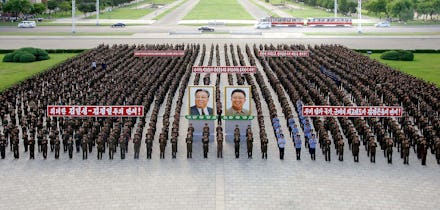Trump tweets US is ‘considering’ halting trade with North Korean allies following nuclear test

President Donald Trump announced Sunday on Twitter that the U.S. is considering halting trade with North Korean allies, as the country considers how to respond to North Korea’s most recent nuclear test.
“The United States is considering, in addition to other options, stopping all trade with any country doing business with North Korea,” Trump said in a tweet.
Trump’s tweet echoes comments made Sunday by Treasury Sec. Steven Mnuchin on Fox News, who said he would draft a new sanctions package stipulating “that anybody that wants to do trade or business with [North Korea] would be prevented from doing trade or business with us.”
“We’re going to work with our allies,” Mnuchin said Sunday. “We’ll work with China, but people need to cut off North Korea economically. This is unacceptable behavior.”
According to MIT’s Observatory of Economic Complexity, North Korea’s current trade partners include India, Russia, Thailand, Burkina Faso, Pakistan, the Philippines and most prominently China, which receives $2.34 billion in North Korean exports and imports $2.95 billion worth of goods.
It was unclear Sunday what the “other options” Trump is referring to could entail, although the president has previously promised to unleash “fire and fury” on North Korea if it continues to threaten the United States.
Trump’s tweet comes in response to North Korea’s most recent nuclear test on Sunday, which the country claims was of a hydrogen bomb that could be mounted on an intercontinental ballistic missile. The nuclear test was reportedly five to six times more powerful than its previous test in September 2016, sparking a wave of condemnations from governments around the world, including China’s foreign ministry.
Trump had previously taken to Twitter Sunday morning to criticize North Korea as a “rogue nation” and decry China’s ineffective response to its escalating nuclear threat, before later tweeting he would be meeting with the military leaders in his administration to discuss the new North Korean threat.